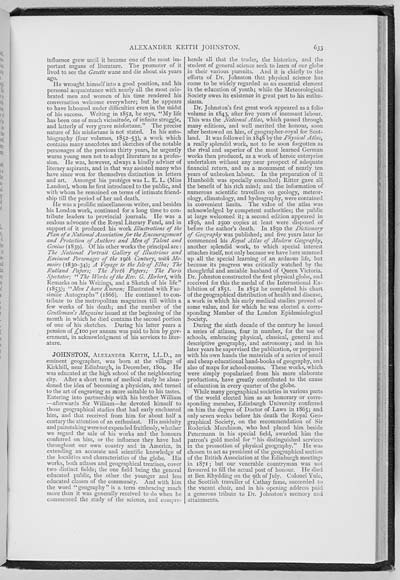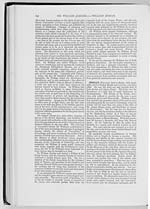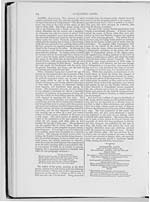Volume 3 > Half-Volume 6
(279) Page 633 - Johnston, Alexander Keith
Download files
Individual page:
Thumbnail gallery: Grid view | List view

633 influence grew until it became one of the most im- portant organs of literature. The promoter of it lived to see the Gazette wane and die about six years ago. He wrought himself into a good position, and his personal acquaintance with nearly all the most cele- brated men and women of his time rendered his conversation welcome everywhere; but he appears to have laboured under difficulties even in the midst of his success. Writing in 1852, he says, "My life has been one of much vicissitude, of infinite struggle, and latterly of very grave misfortune." The precise nature of his misfortune is not stated. In his auto- biography (four volumes, 1852-53), a work which contains many anecdotes and sketches of the notable personages of the previous thirty years, he urgently warns young men not to adopt literature as a profes- sion. He was, however, always a kindly adviser of literary aspirants, and in that way assisted many who have since won for themselves distinction in letters and art. Amongst his proteges was L. E. L. (Miss Landon), whom he first introduced to the public, and with whom he remained on terms of intimate friend- ship till the period of her sad death. He was a prolific miscellaneous writer, and besides his London work, continued for a long time to con- tribute leaders to provincial journals. He was a zealous advocate of the Royal Literary Fund, and in support of it produced his work Illustrations of the Plan of a National Association for the Encouragement and Protection of Authors and Men of Talent and Genius (1839). Of his other works the principal are: The National Portrait Gallery of Illustrious and Eminent Personages of the 19th Century, with Me- moirs (1830-34); A Voyage to the Isle of Elba; The Rutland Papers; The Perth Papers; The Paris Spectator; " The Works of the Rev. G. Herbert, with Remarks on his Writings, and a Sketch of his life" (1853); "Men I have Known; Illustrated with Fac- simile Autographs" (1866). He continued to con- tribute to the metropolitan magazines till within a few weeks of his death; and the number of the Gentleman''s Magazine issued at the beginning of the month in which he died contains the second portion of one of his sketches. During his latter years a pension of �100 per annum was paid to him by gov- ernment, in acknowledgment of his services to liter- ature. JOHNSTON", ALEXANDER KEITH, LL.D., an eminent geographer, was born at the village of Kirkhill, near Edinburgh, in December, 1804. He was educated at the high school of the neighbouring city. After a short term of medical study he aban- doned the idea of becoming a physician, and turned to the art of engraving as more suitable to his tastes. Entering into partnership with his brother William �afterwards Sir William�he devoted himself to those geographical studies that had early enchanted him, and that received from him for about half a century the attention of an enthusiast. His assiduity and painstaking were not expended fruitlessly, whether we regard the sale of his works and the honours conferred on him, or the influence they have had throughout our own country and in America, in extending an accurate and scientific knowledge of the localities and characteristics of the globe. His works, both atlases and geographical treatises, cover two distinct fields; the one field being the general educated public, the other the younger and less educated classes of the community. And with him the word "geography" is a term embracing much more than it was generally received to do when he commenced the study of the science, and compre- hends all that the trader, the historian, and the student of general science seek to learn of our globe in their various pursuits. And it is chiefly to the efforts of Dr. Johnston that physical science has come to be widely regarded as an essential element in the education of youth; while the Meteorological Society owes its existence in great part to his enthu- siasm. Dr. Johnston's first great work appeared as a folio volume in 1843, after five years of incessant labour. This was the National Atlas, which passed through many editions, and well merited the honour, soon after bestowed on him, of geographer-royal for Scot- land. It was followed in 1848 by the Physical Atlas, a really splendid work, not to be soon forgotten as the rival and superior of the most learned German works then produced, as a work of heroic enterprise undertaken without any near prospect of adequate financial return, and as a monument of nearly ten years of unbroken labour. In the preparation of it Humboldt was specially consulted; Ritter gave all the benefit of his rich mind; and the information of numerous scientific travellers on geology, meteor- ology, climatology, and hydrography, were contained in convenient limits. The value of the atlas was acknowledged by competent authorities; the public at large welcomed it; a second edition appeared in 1856, and 2500 copies at least were disposed of before the author's death. In 1850 the Dictionary of Geography was published; and five years later he commenced his Royal Atlas of Modern Geography, another splendid work, to which special interest attaches itself, not only because we have here summed up all the special learning of an arduous life, but because its progress was critically watched by the thoughtful and amiable husband of Queen Victoria. Dr. Johnston constructed the first physical globe, and received for this the medal of the International Ex- hibition of 1851. In 1852 he completed his chart of the geographical distribution of health and disease, a work in which his early medical studies proved of some value, and for which he was elected a corre- sponding Member of the London Epidemiological Society. During the sixth decade of the century he issued a series of atlases, four in number, for the use of schools, embracing physical, classical, general and descriptive geography, and astronomy; and in his later years he supervised the publication, or prepared with his own hands the materials of a series of small and cheap educational hand-books of geography, and also of maps for school-rooms. These works, which were simply popularized from his more elaborate productions, have greatly contributed to the cause of education in every quarter of the globe. While many geographical societies in various parts of the world elected him as an honorary or corre- sponding member, Edinburgh University conferred on him the degree of Doctor of Laws in 1865; and only seven weeks before his death the Royal Geo- graphical Society, on the recommendation of Sir Roderick Murchison, who had placed him beside Petermann in his special field, awarded him the patron's gold medal for "his distinguished services in the promotion of physical geography." He was chosen to act as president of the geographical section of the British Association at the Edinburgh meetings in 1871; but our venerable countryman was not favoured to fill the actual post of honour. He died at Ben Rhydding on the 9th of July. Colonel Yule, the Scottish traveller of Cathay fame, succeeded to the vacant chair, and in his opening address paid a generous tribute to Dr. Johnston's memory and attainments.
Set display mode to:
![]() Universal Viewer |
Universal Viewer | ![]() Mirador |
Large image | Transcription
Mirador |
Large image | Transcription
Images and transcriptions on this page, including medium image downloads, may be used under the Creative Commons Attribution 4.0 International Licence unless otherwise stated. ![]()
| Biographical dictionary of eminent Scotsmen > Volume 3 > Half-Volume 6 > (279) Page 633 - Johnston, Alexander Keith |
|---|
| Description | Volume III. Contains names alphabetically from Macadam to Young. |
|---|

